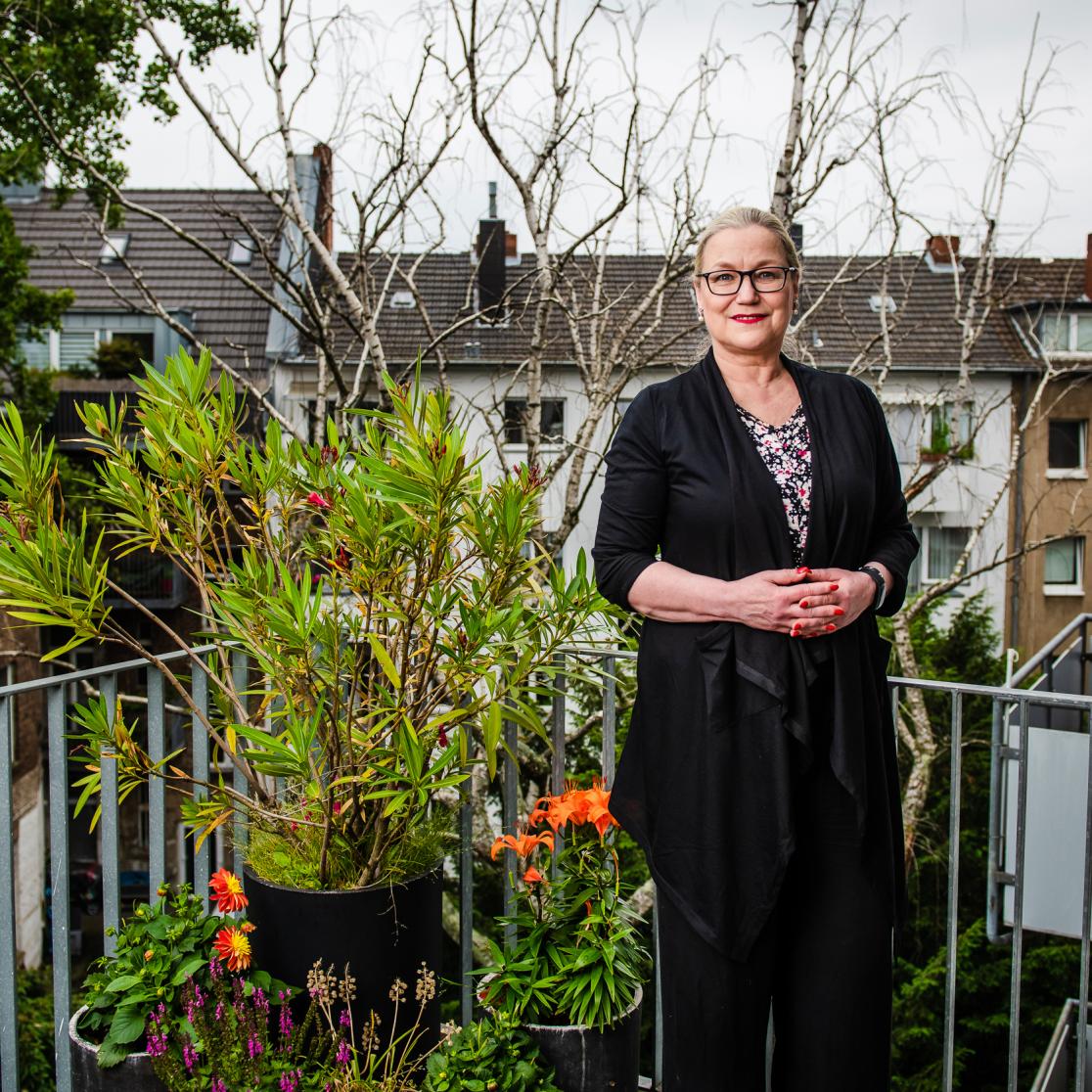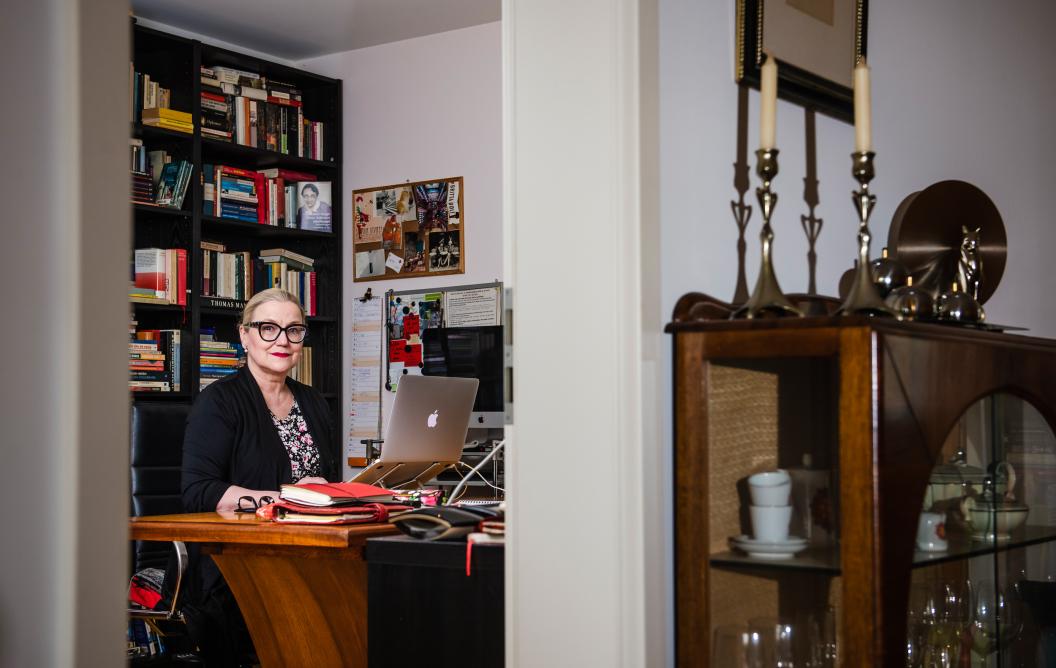What is the right attitude for an ethical lawyer?
She was a criminal lawyer for many years and a member of the Dutch Senate for the GroenLinks (green left) party. Since 2019, she has been professor of Legal Professions & Ethics at Maastricht University. And in her latest novel, De Juiste Houding [The Right Attitude], her fascination with the grey area between real and fake is revealed in a scintillating way. We talk to Britta Böhler about the morally objectionable aspects of the law, forgeries in art and the role of literature in equal rights for men and women.
From distinguished members of society to Doctor Google
Britta sees the increased focus on ethics within the law faculty as a positive thing. “Of course, professional ethics have always been part of the study programme, but now it is a separate course. Whether you are a professional lawyer, judge or prosecutor, ethics play an important role in your work. You have to be well-aware of the subject.” According to her, this is entirely in keeping with the spirit of the times. In the past, the judge and the lawyer were among the distinguished members of society—just like the doctor and the notary. “People looked up to them, accepted everything they said or did. They had a certain natural ethical sense, and also ethical authority. However, people have become more empowered over the years. Doctors have to deal with it—patients know more ‘thanks’ to Doctor Google—and lawyers face the same issue. That requires something different from us, different communication skills. How do I best inform or educate my client? Of course, people come to you for advice, but the relationship is very different now. So, it's good that in addition to legal knowledge you also know about professional ethics.”
Ethical issues in everyday situations
This calls for an example. “With my students, I discuss a situation where your client invites you to her birthday party. Do you go? Regardless of your answer, you need to realise that this is an ethical issue. It sometimes comes up in everyday situations.” In her latest novel, De Juiste Houding, the main character states, ‘The client is always right, even if he is completely wrong’. “You have, as it were, two extremes—the one lawyer who is very patronising and says to the client ‘just listen to me, I know everything’ and the other who just follows the client unquestioningly. You can see this is exactly how things have developed over time.”
More on her book later, but back to the classroom. Ethically correct conduct and defending a murder suspect, how does that go together? “I always ask my students ‘what is your job?’ Just as the doctor’s job is to take care of the patient, the lawyer’s is to assist the client. Whether a doctor is faced with a criminal or an innocent child, he or she always helps. The same applies to a lawyer. You make sure that the client gets a fair trial and that the rules are followed. At the end of the day, you are defending the accused, not the crime.”
Fake, facts, opinions and feelings
Now we go from the classroom to the courtroom. In today's post-truth era, the line between fact and fake seems blurred. It’s a phenomenon that does not apply in the courtroom. “Within the legal profession, we only talk about facts. They are true or false. That is essential for the administration of justice. We don’t talk about opinions or feelings. Gut feelings are indeed gaining ground, but that’s really a completely different category than facts. Of course, you can make multiple and stronger arguments for one opinion over another, but there is not the same contradiction as between true and untrue.” Is this the case with ethics then? “Yes, as far as I am concerned. It is not an exact science like mathematics, but there are still rules.”
Those rules can change over time. What is law at first can later be considered morally objectionable—which is a recurring theme in your book. “Absolutely! Look at the time of national socialism. We find the laws of that time completely reprehensible now. That is quite clear. Also, laws on the position of women have changed drastically over time. My mother used to need her husband's signature to open a bank account and she was fired as soon as she got married. Fortunately, that has now been changed. After all, the law is made by people and you always have to see it in a historical and social context. That’s nice, but we must realise that it can also have its faults. We are striving for universal values, but I’m sure that in decades to come we will look back on our own time and perhaps find it morally objectionable that we didn’t yet have animal rights or artificial intelligence protected by law.”
A page turner
In her latest book, the issues mentioned above become a source of contemplation of the protagonist, Elias. He teaches at a university in the United States and is fascinated by the recovery of stolen art. When he is approached by a somewhat Trumpian businessman and his charming wife about recovering a lost masterpiece, he accepts, after some hesitation. What follows is a thrilling ride with some unavoidable risks. It’s a real page turner.
How much of Britta do we see in Elias? “I guess I'm more cynical,” she laughs. “But the ethical struggles he goes through, there’s some of me and other colleagues in that.” (Small spoiler alert!) Her interest in the grey area between real and fake can be seen throughout the book. While falsehoods have no place in the courtroom and fake news regularly leaves the fourth estate reeling, at other times it can actually make for interesting discussions. She gives an example: “What if a fake turns out well? One of the characters gets into the country with forged identity papers. And who cares if a wealthy Arab prince buys a fake Van Gogh? I find real and fake in the art world particularly fascinating.”
‘The law is biased’
The novel regularly comments on the law. “One of the characters finds the law biased—made by white men, resulting in discrimination against women and minorities. I wrote that down without much hesitation because I strongly agree with it.” In addition to criminal law and international human rights treaties, Britta specialises in women's rights. “I do see that equality between men and women is improving but, in my opinion, this is happening too slowly. Within the law, we may have gotten the big picture right, but now society itself has to change. We’re quick to think that gender equality is already a reality. There is even talk of post-feminism. However, we still need to break free from the patriarchal structures that we are faced with on a daily basis. I too, unfortunately, used to be part of that by always adapting to the system, because I wanted to achieve something and make a difference in my work. But when you hear that the Prime Minister is quicker to interrupt female ministers and does so more often than male colleagues, then we are not there yet. Yes, childcare is better regulated by law in the Netherlands, but the motivation is ‘so that women can also work’. That is downright sexist. Childcare ensures that parents can work.”
Those who think that the position of women is fortunately on the rise should think again, says Britta. “You always have a backlash. And it didn't just start when Trump became president. He obviously didn't make it better, but it was going on much earlier. As far as I'm concerned, it started in the early 1990s. A key moment was when, in 1991, Clarence Thomas was appointed a judge of the Supreme Court of the United States, despite allegations of sexual harassment from professor Anita Hill. Then, you see the same thing happen in 2018 with the appointment of Brett Kavanaugh."
By: Karin Somers (text) Casey O'Dell (translation) and Jonathan Vos (photography).

We are far from finished
"Fortunately, the #metoo movement has created a positive counter-movement, but we must constantly remain alert. Let’s not think we have our house in order here and it all happens ‘over there’: Turkey pulling out of the Istanbul Convention, the abortion discussion.
The male-to-female ratio in the Dutch parliament and at the big companies are also examples. This is shameful. Here, too, we are far from finished.”
Also read
-
Four FASoS researchers awarded NWO XS grants
How do lobbyists use disinformation to sway policymakers? Who gets to shape the historical narrative of occupation and violence? Does growing inequality change the way citizens think about politics? And how have politicians defended “truth” across a century of media revolutions?
-
Reducing the Digital Divide: Empowering Students to Train, Evaluate, and Use AI Text Models
The Maastricht Law and Tech Lab, together with the Brightlands Institute for Smart Society (BISS), obtained a € 100.000 a Comenius Senior Teaching Fellow grant.
-
Green school playgrounds boost concentration and wellbeing
Children at schools with green playgrounds are better able to concentrate and display more social behaviour. This is the conclusion of a follow-up study within the long-running project The Healthy Primary School of the Future .
